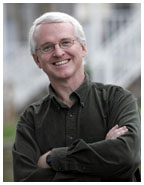|
Web Exclusives: Alumni Spotlight November 22, 2006:
PROFILE Fresh out of graduate school, Martin Eakes *80 and his wife, Bonnie Wright, hopped in their Volkswagen Beetle and drove across North Carolina, stopping in small towns to offer legal and financial advice to unemployed factory workers. At the time, textile mills and lumber and furniture factories were shutting down left and right because of soaring interest rates and a deep national recession. Through a nonprofit organization they created, Self-Help, Eakes and Wright assisted workers who wanted to set up employee-owned factories to save their jobs. The problem was that the displaced workers couldn’t qualify for traditional bank financing. Before long Eakes realized that what the workers really needed was not advice, but money. So he started the Self-Help Credit Union, which provides loans to borrowers who are underserved by traditional banks averse to taking on more financial risk. In 1984, Self-Help also began lending money to low-income families to buy their first homes. Eakes, who grew up in a predominantly African-American community in Greensboro, N.C., and lives in Durham, knew that the people he was loaning money to — many of them single, African-American mothers — would make good on their loans. Self-Help is based on the belief that the best way to fully realize the civil and women’s rights movements is to provide better economic opportunities for minorities and women. Based in Durham, Self-Help is no handout program. The individuals and families Eakes works with must repay their loans, or else Self-Help will foreclose and redeploy the funds to someone else. “We tell families our job is to meet you halfway but not one step beyond,” says Eakes. That tough love seems to work. Fewer than one half of 1 percent per year of Self-Help’s 40,000 home-loan borrowers, about a quarter of whom live in North Carolina, have not repaid. “People of modest means are incredibly good loan risks if they just get the chance to own that first home,” says Eakes, who earned a law degree from Yale and a master’s in public affairs from the Woodrow Wilson School. Self-Help, which celebrated its 25th anniversary in 2005, has changed the lives of thousands of families. One woman in her 50s, for example, had worked full time since she was 14, but never had owned a house or a safe means of heating the places she rented. She relied on leaving the oven door open. Several years ago she secured a loan through Self-Help, bought her first house, and finally had a furnace that worked. The first night in her new home, she stayed up all night, marveling at the thermostat turning on and off. Self-Help has grown over the years. It is reinvigorating distressed
communities by lending to small businesses, child-care centers, charter schools,
and other nonprofit organizations. As a result of his work, Eakes has received
death threats from the Ku Klux Klan, unhappy that he is lending money to African-Americans,
and from drug dealers, upset that he is cleaning up neighborhoods. For his work
with Self-Help, Eakes was named the “2005 Tar Heel of the Year” by
the Raleigh-based newspaper The News &
Observer. The real heroes of Self-Help are not Martin and his wife, he
says. The real heroes, he insists, are “the families who work against enormous
odds to create safety for their children.” By K.F.G.
|
||

